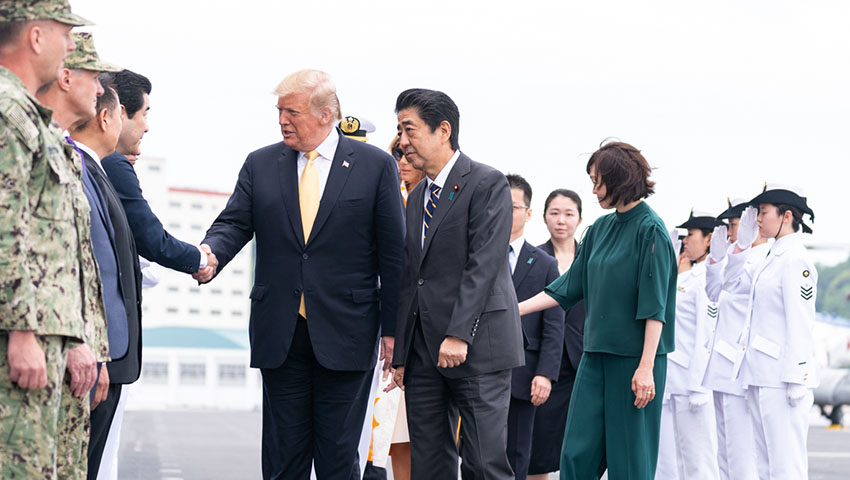A senior US Department of Defense official has confirmed the DoD is in discussions with Australia for the hosting of a mineral processing facility, in a bid to reduce America’s reliance on China for specialised materials for military equipment.
To continue reading the rest of this article, please log in.
Create free account to get unlimited news articles and more!
It's just the latest in a series of moves from both China and the US in the economic "tug of war" taking place, with the Pentagon also recently accusing Beijing of "bullying tactics" in regional economic zones.
With China threatening to slow the export of rare earths to the US, minerals that are vital for fighter jets, tanks and consumer electronics, attention has quickly shifted to Australia, where Lynas Corp, the world's biggest non-China rare earths miner and processor, is based.
“We’re concerned about any fragility in the supply chain and especially where an adversary controls the supply,” Ellen Lord, Under Secretary of Defense for Acquisition and Sustainment, explained to a briefing in Washington.
"One of the highest potential avenues is to work with Australia."
With China often bringing minerals back to their country for processing only, Lord added that such an agreement with Australia would follow the same vein, in that the arrangement would primarily be focused on rare earth processing.
It's unclear where such a facility would be based in Australia, but with Lynas Corp's concentration plant located in Mt Weld, Western Australia, it could be speculated that it would be in the same region, but the company also has a processing plant based in Malaysia.
A report into the matter of America's importing of rare earth materials took place last year after the closure of the US' sole refinery in 2015, with the Pentagon highlighting the importance of finding alternatives to China.
“China represents a significant and growing risk to the supply of materials and technologies deemed strategic and critical to US national security; a challenge shared by key allies such as Germany and Australia,” the report said.
Because of this, US President Donald Trump issued several presidential determinations that US DoD funds would go towards developing a new rare earths capability.
Despite this intention from the US to move away from dependence on China, Trump also has recently predicted that a trade deal could be forged with China following "positive signs" from Beijing, an eyebrow raising statement considering the Pentagon's critical analysis of recent moves from China in the south-east Asia region.
“Recently, China resumed its coercive interference in Vietnam’s long-standing oil and gas activities in the South China Sea,” a Pentagon statement said.
This is in reference to a Chinese survey vessel extending its operations closer to Vietnam's coastline than had recently been carried out, with Haiyang Dizhi 8 entering Vietnam's exclusive economic zone last month for a week-long seismic survey.
This activity led to a stand-off between military and coastguard vessels from Vietnam and China.
Australia has already eyed the potential for co-operation on critical minerals, with works ongoing since last year on such arrangements.
“Continuity and guarantee of supply of rare earths and critical minerals is vital to a range of sectors, including defence. Co-operation with international partners is integral to this effort," an Australian Defence spokeswoman told Reuters.
Defence Connect recently highlighted the need for Australia to grow its own strategic reserve, especially for liquid energy supplies.
Australia's industry currently has limited capacity to provide and maintain a limited number of critical spare parts for high-technology platforms like the Lockheed Martin F-35, the Boxer combat reconnaissance vehicles and M1 Abrams, and Navy's Hobart Class and future Hunter Class and Attack Class vessels, as well as the nation's declining ability to manufacture and produce critical strategic resources – including steel, coking coal and aluminium.
"While much of the focus has been placed on Australia's concerning lack of liquid energy resources – the issue is a broader tactical and strategic challenge requiring a nuanced and considered response in order to insulate Australia from both regional and global shocks and supply constrictions," the article reads.
"While Australia enjoys a virtually unrivalled wealth of natural resources, the ability to refine and produce vast quantities of steel, coking coal and now domestic agricultural produce and critical, specialised medical supplies also serve as a glaring gap in the broader national security debate. Accordingly, any national strategic reserve policy requires a holistic approach to incorporate these into the development of any policy response.
"Contemporary Australia has been far removed from the harsh realities of conflict, with many generations never enduring the reality of rationing for food, energy, medical supplies or luxury goods, and even fewer within modern Australia understanding the socio-political and economic impact such rationing would have on the now world-leading Australian standard of living."
You can read the full article here.

 Login
Login







